Menstruation: A Sociological View on an Unseen Discrimination & Taboo in Indian Society.
Relevance: Sociology: Social Changes in India: Emerging issues: ageing, sex ratios, child and infant mortality, reproductive health. Challenges of Social Transformation: Poverty, deprivation and inequalities. (c) Violence against women. Patriarchy, entitlements and sexual division of labour. & G.S paper I: Society and social issues: Women Issues.
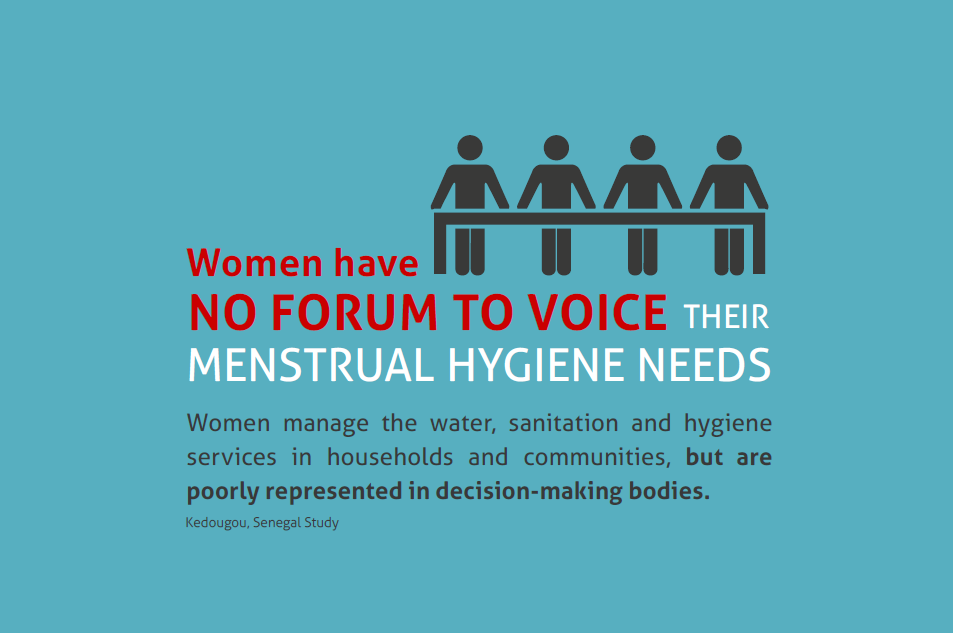
INTRODUCTION
Menstruation is a phenomenon unique to girls. However, it has always been surrounded by taboos and myths that exclude women from many aspects of socio-cultural life. In India, the topic has been a taboo until date. Such taboos about menstruation present in many societies impact on girls’ and women’s emotional state, mentality and lifestyle and most importantly, health. The challenge, of addressing the socio-cultural taboos and beliefs in menstruation, is further compounded by the low girls’ knowledge levels and understandings of puberty, menstruation, and reproductive health. Thus, there is the need to follow a strategic approach in combating these issues.
ANALYSIS
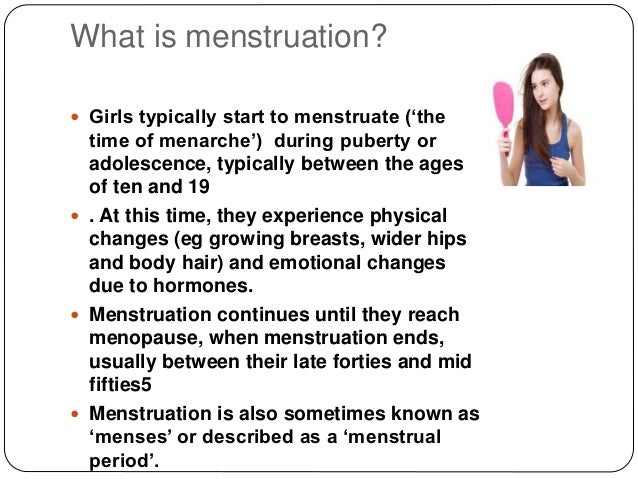
Discrimination against menstruating women is widespread in India, where periods have long been a taboo and considered impure.
They are often excluded from social and religious events, denied entry into temples and shrines and even kept out of kitchens.
Given the lack of conversation about periods, according to one study, 71% of adolescent girls in India are unaware of menstruation until they get it themselves.
IMPORTANT FACTS TO BE CONSIDERED
- Campaigners say it shows that parents rarely prepare their daughters for something they know is bound to happen. And this unpreparedness leads to so much avoidable fear and anxiety.
- The difficulty of accessing sanitary pads is another major issue.
- India scrapped a 12% tax on sanitary products in 2018 after months of campaigning by activists.
- only 36% of India’s 355 million menstruating females use sanitary napkins, while the rest use old rags, husk, ash, leaves, mud and soil and such other life-threatening materials to manage their flow.
| And menstrual health experts say the current coronavirus crisis has worsened matters further in India. The country is under a strict lockdown which has severely impacted production and supplies of menstrual hygiene products. |
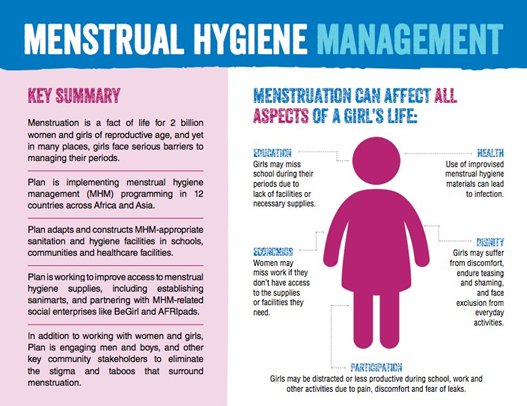
- According to Plan International UK, an international development charity, one in 10 disadvantaged girls below the age of 21 cannot afford sanitary products and uses unhygienic substitutes such as newspaper, toilet paper and socks.
- From an early age, girls learn to live with the pain and fear and seldom do we see a girl seek help when in physical or mental discomfort due to periods.
- Campaigners say the main reasons are a lack of clean toilets in schools and poor access to sanitary products. There’s also fear of staining and girls worry about being mocked by their classmates.
- The study also found that a large number of women considered periods as dirty, explaining why menstruating women are often ostracised from social and cultural activities and are forced to put up with all sorts of restrictions.
GLOBAL SCENARIO
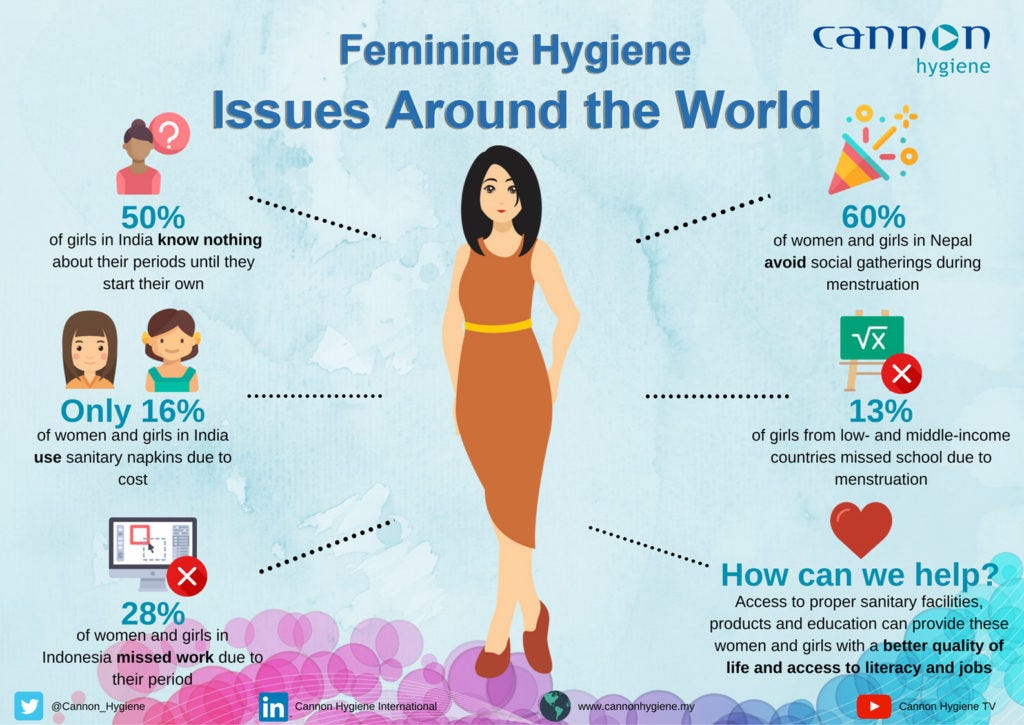
Despite recent campaigns by women to challenge menstruation taboos and increasing attention to the issue of menstruation in the media, research, policy-making, and cultural discussion, they underscored the need for “more efforts to address challenges faced by women and girls”.
In some countries, said the experts, menstruating women continue to be viewed as “contaminated and impure”, often restricted and forbidden to engage in activities like touching water or cooking, attending religious and cultural ceremonies or other community activities.
Menstruating women and girls can even be banished to outside sheds according to custom, where they suffer in cold and isolation, often at risk of life-threatening illness and attack.
The patriarchal control exerted to constraint women’s behavior and mobility during menstruation undermines their agency and equality” the experts underscored. When combined with the stigma and shame that women and girls are made to feel during that time, it is truly disempowering.
Many live without any privacy to wash, or access to safe, clean toilets or even separate sanitation facilities at work, or in the classroom, or when they’re visiting other public institutions.
Additionally, sanitary hygiene products are often inaccessible or too costly, particularly for those living in poverty and crisis situations As States’ policies rarely address these issues. Vulnerable women can be forced to use improvised, unhygienic materials that may cause leaking and infection, putting their health at serious risk.

“Stigma around menstruation has significant health impacts on women’s and girls’ health”, the experts highlighted, pointing out that some providers are prone to dismiss serious issues related to menstruation, citing that it can take several years to diagnose endometriosis and dysmenorrhea – painful disorders that can also affect fertility.

Due to stigma and a lack of sexual education, menstruation knowledge remains limited leaving many girls with negative and ambivalent feelings and experiencing psycho-social stress, which also impacts their ability to learn, said the experts.
“The stigma and shame generated by stereotypes around menstruation have severe impacts on all aspects of women’s and girls’ human rights In addition, some countries link the first menstruation cycle to being ready to marry, increasing the risks of adolescent pregnancy, limiting girls’ education and work opportunities.
And the situation spirals further in educational institutions and workplaces as a lack of accommodation for menstruating women and girls’ health, such as allowing rest periods, “has an impact on school and job attendance, and thus affects women’s economic participation and advancement, undermining gender equality”, added the experts.
Myths Related to Menstruation in India

In India even mere mention of the topic has been a taboo in the past and even to this date the cultural and social influences appear to be a hurdle for advancement of knowledge on the subject.
Culturally in many parts of India, menstruation is still considered to be dirty and impure. The origin of this myth dates back to the Vedic times and is often been linked to Indra’s slaying of Vritras.
For, it has been declared in the Veda that guilt, of killing a brahmana-murder, appears every month as menstrual flow as women had taken upon themselves a part of Indra’s guilt.
Further, in the Hindu faith, women are prohibited from participating in normal life while menstruating. She must be “purified” before she is allowed to return to her family and day to day chores of her life.
However, scientifically it is known that the actual cause of menstruation is ovulation followed by missed chance of pregnancy that results in bleeding from the endometrial vessels and is followed by preparation of the next cycle. Therefore, there seems no reason for this notion to persist that menstruating women are “impure.”
Many girls and women are subject to restrictions in their daily lives simply because they are menstruating. Not entering the “puja” room is the major restriction among urban girls whereas, not entering the kitchen is the main restriction among the rural girls during menstruation.
Menstruating girls and women are also restricted from offering prayers and touching holy books.
The underlying basis for this myth is also the cultural beliefs of impurity associated with menstruation. It is further believed that menstruating women are unhygienic and unclean and hence the food they prepare or handle can get contaminated.
According to study by Kumar and Srivastava in 2011, participating women also reported that during menstruation the body emits some specific smell or ray, which turns preserved food bad.
And, therefore, they are not allowed to touch sour foods like pickles. However, as long as general hygiene measures are taken into account, no scientific test has shown menstruation as the reason for spoilage of any food in making.
Cultural norms and religious taboos on menstruation are often compounded by traditional associations with evil spirits, shame and embarrassment surrounding sexual reproduction.
In some cultures, women bury their cloths used during menstruation to prevent them being used by evil spirits.
In Surinam, menstrual blood is believed to be dangerous, and a malevolent person can do harm to a menstruating woman or girl by using black magic (“wisi”). It is also believed that a woman can use her menstrual blood to impose her will on a man.
Interestingly, in Asia including India, such beliefs are still practiced.
However, there seems to be no logical or scientific explanation for this.
In some parts of India, some strict dietary restrictions are also followed during menstruation such as sour food like curd, tamarind, and pickles are usually avoided by menstruating girls.
It is believed that such foods will disturb or stop the menstrual flow.
As far as the exercise is concerned, many studies in India and elsewhere have revealed that many adolescent girls believe that doing exercise/physical activity during menses aggravate the dysmenorrhea while in real exercise can help relieve the menstruating women with symptoms of premenstrual syndrome and dysmenorrhea and relieve bloating. Exercise also causes a release of serotonin, making one feel much happier.
In some parts of India, perceptions of Hinduism center on notions of purity and pollution. Bodily excretions are believed to be polluting, as are the bodies when producing them. All women, regardless of their social caste, incur pollution through the bodily processes of menstruation and childbirth. Water is considered to be the most common medium of purification. The protection of water sources from such pollution, which is the physical manifestation of Hindu deities, is, therefore, a key concern.
This highlights the possible reason why menstruating women are not allowed to take a bath especially for first few days of their menstrual period. It is believed that if a girl or women touches a cow while she is on her period, that the cow will become infertile – leading girls to associate their own bodies with curse and impurity.
Impact of Myths Related to Menstruation on Women’s Life

Such taboos about menstruation present in many societies impact on girls’ and women’s emotional state, mentality and lifestyle and most importantly, health. Large numbers of girls in many less economically developed countries drop out of school when they begin menstruating. This includes over 23% of girls in India.
In addition to this, the monthly menstruation period also creates obstacles for female teachers.
Thus, the gender – unfriendly school culture and infrastructure and the lack of adequate menstrual protection alternatives and/or clean, safe and private sanitation facilities for female teachers and girls undermine the right of privacy.
There are health and hygiene issues also to consider relating to girls and menstruation. Over 77% of menstruating girls and women in India use an old cloth, which is often reused. Further, 88% of women in India sometimes resort to using ashes, newspapers, dried leaves and husk sand to aid absorption.
Poor protection and inadequate washing facilities may increases susceptibility to infection, with the odor of menstrual blood putting girls at risk of being stigmatized. The latter may have significant implications for their mental health.
The challenge, of addressing the socio-cultural taboos and beliefs in menstruation, is further compounded by the fact the girls’ knowledge levels and understandings of puberty, menstruation, and reproductive health are very low
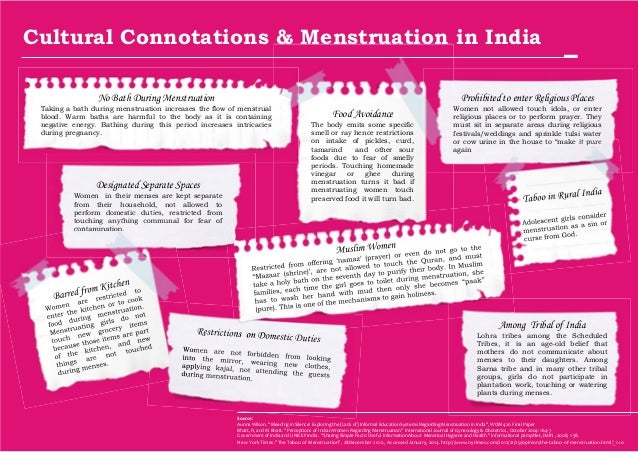
Further progress needed
More needs to be done globally to address the menstrual health needs of women and girls and transform the systems, norms and attitudes to support women’s and girls’ menstrual health and well-being” the experts argued, stating that “a global shift in cultures” is needed to respect menstruation, acknowledge it as a human rights issue and “eliminate discrimination, shame and stigma too often attached to it.
It is time we realise that menstruation is just a biological process and the secrecy surrounding it must go. It is important to normalise menstruation and destroy taboos around this natural process.
For more such notes, Articles, News & Views Join our Telegram Channel.
Click the link below to see the details about the UPSC –Civils courses offered by Triumph IAS. https://triumphias.com/pages-all-courses.php

